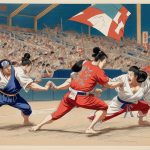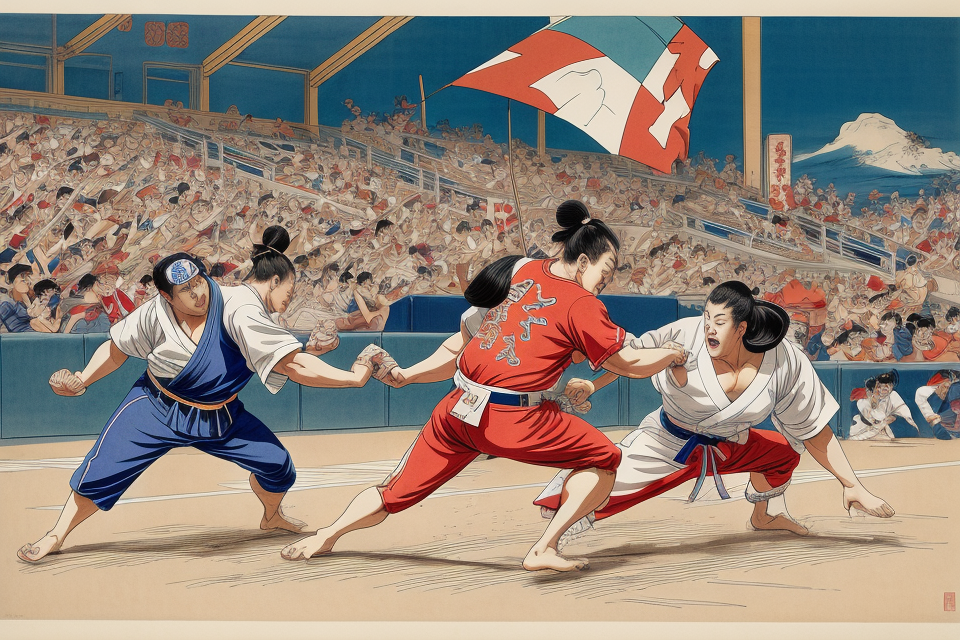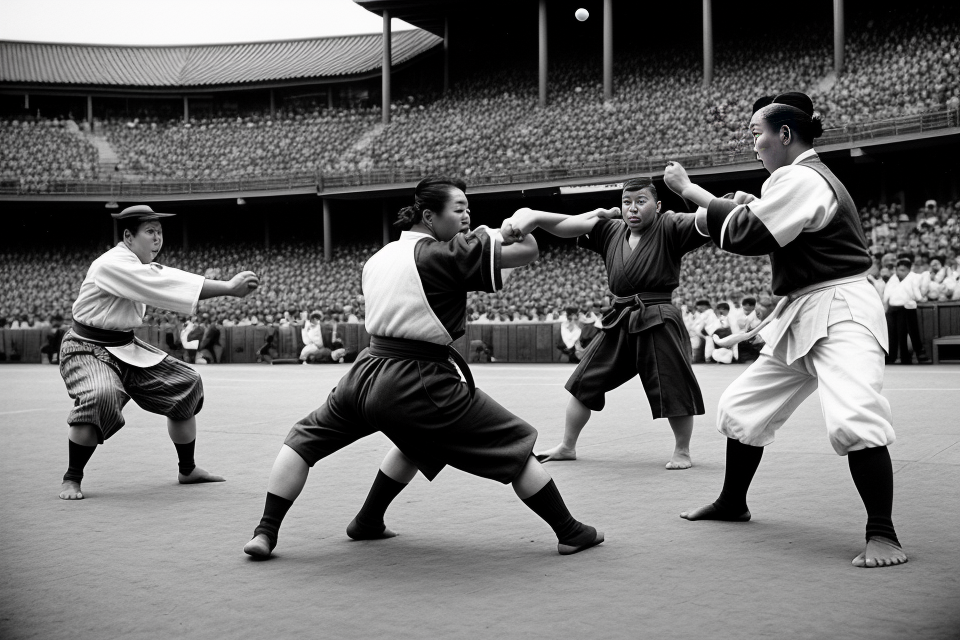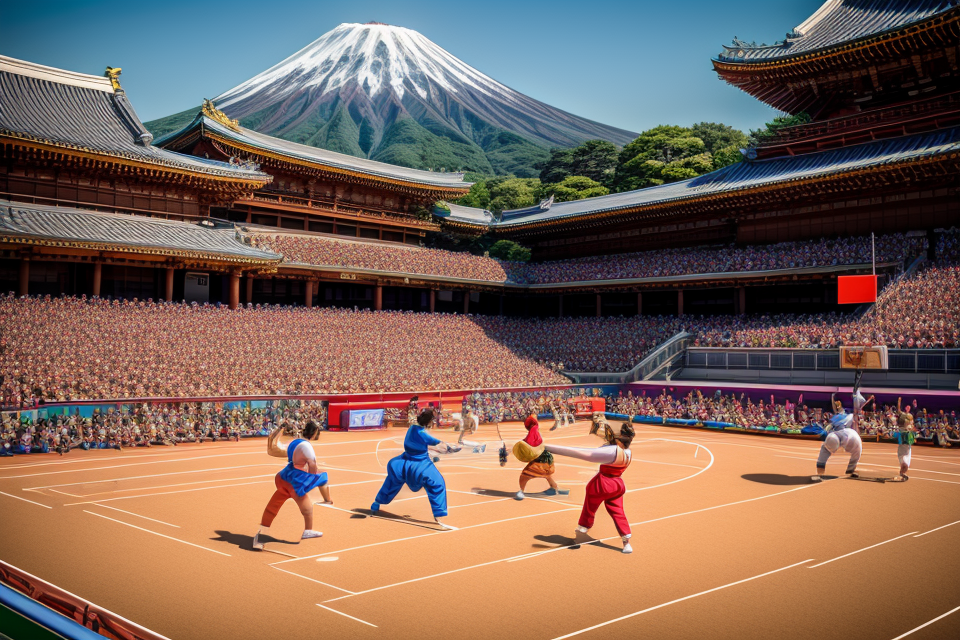Japan is renowned for its rich cultural heritage, but did you know that sports play a significant role in Japanese society? With a history of victories in global competitions and a thriving sports industry, one might assume that sports are a national obsession. In this article, we’ll explore the fascinating world of Japanese sports, examining its impact on the nation’s culture, economy, and social fabric. From sumo wrestling to baseball, we’ll delve into the unique aspects of Japan’s sporting culture and uncover why sports are not just a pastime, but a way of life. Get ready to discover the passion and dedication that fuels Japan’s love affair with sports.
The Importance of Sports in Japanese Culture
The Historical Significance of Sports in Japan
Japan has a long and storied history when it comes to sports. From ancient times to the modern era, sports have played a significant role in Japanese culture and society. In this section, we will explore the historical significance of sports in Japan and how they have evolved over time.
The Origins of Sports in Japan
Sports in Japan can be traced back to ancient times, where martial arts and other physical activities were used for self-defense and military training. For example, kendo, a modern Japanese martial art that uses bamboo swords, has its roots in the ancient samurai tradition.
The Emergence of Modern Sports in Japan
As Japan began to modernize in the late 19th century, Western-style sports were introduced to the country. Baseball, for example, was first introduced to Japan in 1872 by an American missionary, and it quickly became one of the most popular sports in the country. Other Western sports, such as football, basketball, and tennis, were also introduced and gained popularity in Japan.
The Rise of National Sports in Japan
During the early 20th century, the Japanese government began to promote sports as a way to promote national unity and enhance the country’s international standing. This led to the rise of national sports, such as sumo wrestling and judo, which became symbols of Japanese culture and identity.
The Impact of Sports on Japanese Society
Sports have had a profound impact on Japanese society, both positive and negative. On the one hand, sports have provided opportunities for young people to engage in physical activity, develop teamwork skills, and gain confidence and self-esteem. On the other hand, sports have also contributed to a culture of extreme competition and pressure to win at all costs, which can lead to physical and mental health problems among athletes.
In conclusion, the historical significance of sports in Japan cannot be overstated. From ancient martial arts to modern Western-style sports, sports have played a vital role in Japanese culture and society, and continue to shape the lives of young people in the country today.
The Role of Sports in Japanese Society
Sports play a significant role in Japanese society, and they are deeply ingrained in the culture of the country. This can be seen in the way that sports are not just a form of entertainment or leisure activity, but rather a means of fostering community spirit, building character, and instilling important values in young people.
One of the most important ways in which sports impact Japanese society is through the development of teamwork and collaboration. In many sports, success depends on the ability of players to work together towards a common goal, and this same ethos is carried over into other areas of life. This is particularly evident in the corporate world, where teamwork and collaboration are highly valued.
Another important aspect of sports in Japan is the emphasis on physical fitness and health. Japan has one of the highest life expectancies in the world, and many attribute this to the country’s focus on maintaining a healthy lifestyle through regular exercise and physical activity. In addition to promoting physical health, sports also provide a means of reducing stress and promoting mental well-being.
Finally, sports are also a way for Japanese people to connect with one another and build social networks. Whether it’s through playing sports with friends and family, attending games as a spectator, or cheering on the national team, sports provide a common ground for people to come together and bond over a shared passion. This sense of community is particularly important in a country where social connections are highly valued.
Overall, the role of sports in Japanese society is multifaceted and far-reaching. From fostering teamwork and collaboration to promoting physical and mental health, sports play an important role in the daily lives of many Japanese people.
Major Sports in Japan
Professional Baseball
Professional baseball is one of the most popular sports in Japan, with a rich history dating back to the late 19th century. The sport is played by two teams, each consisting of nine players, and the objective is to score more runs than the opposing team by hitting a ball thrown by a pitcher and running around the bases.
The Origins of Professional Baseball in Japan
The origins of professional baseball in Japan can be traced back to the late 19th century, when American sailors introduced the sport to Japanese port towns. In 1872, the first baseball club in Japan was formed in Yokohama, and from there, the sport gained popularity throughout the country.
The Rise of Professional Baseball in Japan
Professional baseball in Japan began to take shape in the 1920s, with the establishment of the Japanese Baseball League (JBLP). The league consisted of six teams, and it was dominated by Japanese players. However, with the influx of American players during World War II, the league saw a significant change in its style of play.
After the war, the JBLP was reorganized into the Nippon Professional Baseball (NPB) league, which is the current professional baseball league in Japan. The NPB consists of two leagues, the Central League and the Pacific League, with six teams in each league.
The Cultural Significance of Professional Baseball in Japan
Professional baseball is deeply ingrained in Japanese culture, with many people viewing it as a national pastime. The sport is played in many amateur leagues throughout the country, and it is not uncommon for children to start playing baseball at a young age.
Baseball is also closely tied to the Japanese education system, with many schools having baseball teams. Additionally, baseball is a popular subject in Japanese media, with many television shows, movies, and books dedicated to the sport.
The Economic Impact of Professional Baseball in Japan
Professional baseball has a significant economic impact in Japan, with many teams generating substantial revenue from ticket sales, merchandise, and advertising. The NPB is also a popular destination for foreign players, with many top players from the United States, Latin America, and other countries choosing to play in Japan.
The success of Japanese baseball teams in international competitions, such as the World Baseball Classic, has also helped to boost the sport’s popularity and economic impact in Japan.
Football (Soccer)
Football, also known as soccer in some countries, is one of the most popular sports in Japan. The Japan Football Association (JFA) was established in 1921, and since then, football has been growing in popularity across the country. The JFA organizes various football leagues, tournaments, and international competitions, making it an integral part of Japan’s sporting culture.
Professional Football Leagues
The Japan Professional Football League (J.League) is the top-tier football league in Japan, comprising 20 teams that compete against each other throughout the season. The league was established in 1992, and since then, it has become a prominent part of Japan’s sporting landscape. The J.League has gained significant popularity, with many top-level players from around the world participating in it.
National Football Team
Japan’s national football team, known as the Samurai Blue, represents the country in international competitions such as the FIFA World Cup, the AFC Asian Cup, and the East Asian Cup. The team has been steadily improving over the years, with notable achievements in major tournaments. For instance, Japan qualified for the 2018 FIFA World Cup for the first time in 20 years, making a significant impact on the global football stage.
Grassroots Football
Football is also widely played at the grassroots level in Japan. The JFA promotes football by organizing various youth leagues, tournaments, and development programs for children and young adults. Many local communities have their football clubs, providing opportunities for people of all ages to engage in the sport.
Football Culture
Football has a significant cultural impact in Japan. Football matches are often accompanied by enthusiastic cheering and support from fans, who wear team jerseys and wave flags. Many fans form fan clubs, organizing events and activities to show their support for their favorite teams. Additionally, football has been instrumental in fostering international relations, with various international football exchange programs and friendly matches between Japanese and foreign teams.
In conclusion, football, or soccer, is a prominent sport in Japan, with a strong presence in professional leagues, the national team, grassroots levels, and the broader cultural landscape. The JFA’s efforts in promoting football have contributed significantly to the sport’s popularity and cultural significance in Japan.
Sumo Wrestling
Sumo wrestling is a traditional combat sport that originated in Japan over 1,500 years ago. It is widely regarded as Japan’s national sport and is deeply ingrained in the country’s culture and history.
History of Sumo Wrestling
Sumo wrestling has its roots in ancient Japanese culture, where it was initially used as a form of martial arts and self-defense. Over time, it evolved into a competitive sport, with the first official tournaments being held in the Edo period (1603-1868).
The Rules of Sumo Wrestling
The objective of sumo wrestling is to force the opponent out of the ring or to make them touch the ground with anything other than their feet. Matches are held on a circular ring called a “dohyo,” which is covered in sand and salt.
The wrestlers wear traditional mawashi (loincloth) and must stand with their feet facing towards the center of the ring. The match begins when the wrestlers push or strike each other, with the winner being the one who manages to force their opponent out of the ring or make them touch the ground with anything other than their feet.
Sumo Wrestlers
Sumo wrestlers, or “rikishi,” are typically large and heavily built, with weights ranging from 330 to 440 pounds. They follow a strict training regimen that includes weightlifting, jogging, and traditional sumo techniques.
In addition to physical training, sumo wrestlers also adhere to a strict code of conduct known as “sumo etiquette.” This includes rules on diet, behavior, and appearance, such as wearing the traditional mawashi and shaving their hair in a specific style.
The Six Major Tournaments
Sumo wrestling has six major tournaments, known as “honbasho,” which are held throughout the year. The tournaments are held in Tokyo, Osaka, Nagoya, and other major cities, and attract thousands of spectators.
The tournaments are held over 15 days, with each wrestler competing against other wrestlers in their weight class. The winner of each tournament is awarded a trophy and a cash prize, while the losers are demoted to lower ranks.
Popularity of Sumo Wrestling
Sumo wrestling remains one of the most popular sports in Japan, with a dedicated fan base and extensive media coverage. It is also gaining popularity internationally, with regular tournaments held in countries such as the United States and Canada.
In conclusion, sumo wrestling is a unique and deeply ingrained aspect of Japanese culture and history. Its rules, wrestlers, and tournaments are all integral to the sport’s enduring popularity, both in Japan and around the world.
The Popularity of Basketball
Basketball has become increasingly popular in Japan over the years, particularly among the younger generation. This can be attributed to the success of Japanese basketball players in international competitions, as well as the growth of the professional basketball league in the country.
The Japanese Professional Basketball League (B.League) was established in 2016, and since then, it has seen a surge in popularity. The league comprises 36 teams, with players from Japan, the United States, and other countries. The league has a dedicated fan base, with many games being sold out.
The success of Japanese basketball players in international competitions has also contributed to the sport’s popularity. The Japanese national team has had success in recent years, including a bronze medal win at the 2019 FIBA World Cup. This success has inspired many young people to take up the sport and follow in the footsteps of their heroes.
Moreover, basketball is a popular sport in Japanese schools, with many schools having basketball teams. This has helped to create a pipeline of talented players who can compete at the highest level.
Overall, basketball has become a significant part of Japan’s sporting culture, and its popularity is expected to continue to grow in the coming years.
The Rise of Rugby in Japan
Rugby is a relatively new sport in Japan, but it has rapidly gained popularity in recent years. The Japan Rugby Football Union was established in 1920, but it wasn’t until the 1960s that the sport began to gain traction in the country. Today, rugby is one of the fastest-growing sports in Japan, with a significant increase in participation rates and spectatorship.
One of the main reasons for the rise of rugby in Japan is the success of the Japanese national rugby team, known as the “Brave Blossoms.” The team has had several notable victories in recent years, including their upset win over South Africa during the 2015 Rugby World Cup. This victory captured the hearts of the Japanese public and inspired a new generation of rugby players and fans.
Another factor contributing to the rise of rugby in Japan is the influence of international rugby events held in the country. Japan has hosted several major rugby tournaments, including the Rugby World Cup in 2019, which attracted millions of spectators and helped to raise the profile of the sport.
The popularity of rugby in Japan is also fueled by the success of domestic rugby teams. The Tokyo-based Suntory Sungoliath is one of the most successful teams in Japan’s Top League, and they have a large following of dedicated fans. Other teams, such as the Kobe Steelers and the Ricoh Black Rams, have also gained popularity in recent years.
Rugby culture in Japan is characterized by a strong sense of community and camaraderie. Many rugby clubs and teams are tightly knit, with members who support each other both on and off the field. Rugby matches often attract a diverse crowd of fans, including families, young people, and businesspeople, who come together to enjoy the sport and socialize.
Overall, the rise of rugby in Japan is a testament to the country’s passion for sports and its willingness to embrace new and exciting activities. As rugby continues to grow in popularity, it is likely to become an even more integral part of Japan’s sporting culture.
The Success of Japanese Athletes
Olympic Victories
Japan has a long history of success in the Olympic Games, dating back to its first participation in 1912. Since then, Japanese athletes have consistently performed at a high level, winning numerous medals across a wide range of sports.
In recent years, Japan has particularly excelled in sports such as gymnastics, judo, and wrestling, with many of its athletes achieving worldwide recognition and admiration. For example, gymnast Kohei Uchimura has won numerous Olympic and World Championship medals, and is widely considered one of the greatest gymnasts of all time. Similarly, judoka (judo competitors) such as Taka Goto and Ayumi Tanimoto have also achieved great success on the international stage.
Japan’s success in the Olympic Games is not limited to individual sports, however. The country has also achieved notable success in team sports such as soccer (football) and baseball, with the national teams consistently performing at a high level on the international stage.
Overall, Japan’s consistent success in the Olympic Games is a testament to the country’s dedication to sports and its commitment to training and developing elite athletes. It is clear that sports play a significant role in Japanese culture and society, and that the country’s success in the Olympic Games is a source of national pride and inspiration.
The Global Impact of Japanese Athletes
Japanese athletes have made a significant impact on the global sports scene, with their remarkable achievements and successes in various sports. This section will delve into the global impact of Japanese athletes and how they have influenced the world of sports.
Wide Range of Sports Dominated by Japanese Athletes
Japanese athletes have been successful in a wide range of sports, including sports such as gymnastics, judo, wrestling, tennis, and figure skating. They have consistently performed at a high level and have achieved remarkable success in these sports, winning numerous medals and accolades.
International Recognition and Adoration
Japanese athletes have received international recognition and adoration for their outstanding performances. They have become role models and inspiration for aspiring athletes around the world. Their success has helped to promote their respective sports and has contributed to the growth and popularity of these sports globally.
Promoting Japanese Culture and Values
The success of Japanese athletes has also helped to promote Japanese culture and values on the global stage. Through their performances, they have showcased the discipline, dedication, and hard work that is associated with Japanese culture. They have also demonstrated the importance of respect, humility, and sportsmanship, which are core values that are deeply ingrained in Japanese society.
Inspiring Future Generations of Athletes
The success of Japanese athletes has also inspired future generations of athletes in Japan and around the world. They have served as an inspiration for young athletes to pursue their dreams and work hard to achieve their goals. They have shown that with dedication, hard work, and determination, anything is possible, and this has motivated many young athletes to strive for excellence in their respective sports.
In conclusion, the global impact of Japanese athletes cannot be overstated. They have achieved remarkable success in various sports, received international recognition and adoration, promoted Japanese culture and values, and inspired future generations of athletes. Their success has had a profound impact on the world of sports and has helped to promote the growth and popularity of their respective sports globally.
The Future of Sports in Japan
Developing the Next Generation of Athletes
Japan’s sporting culture has always been characterized by a strong emphasis on developing the next generation of athletes. The country’s passion for sports has led to the establishment of numerous programs and initiatives aimed at identifying and nurturing young talent. This section will explore the various ways in which Japan is working to develop the next generation of athletes.
Grassroots Initiatives
At the grassroots level, Japan has a well-established network of sports clubs and organizations that work to identify and train young athletes. These clubs are often run by volunteers and are dedicated to providing children with access to high-quality coaching and facilities. Many of these clubs receive support from local governments and corporate sponsors, which helps to ensure their continued operation.
School Sports Programs
Japan’s education system also plays a significant role in developing the next generation of athletes. School sports programs are widely available, and many schools have dedicated sports facilities and coaches. These programs are designed to provide students with a well-rounded athletic experience and to help them develop the skills and discipline necessary to excel in their chosen sports.
National Programs
The Japanese government has also implemented a number of national programs aimed at developing the next generation of athletes. These programs include the Japan Olympic and Paralympic Training Center, which provides elite athletes with access to world-class training facilities and coaching. The government also provides financial support to athletes and coaches through scholarships and grants, which helps to ensure that talented individuals from all backgrounds have the opportunity to pursue their athletic dreams.
Professional Leagues and Teams
Finally, Japan’s professional sports leagues and teams play a critical role in developing the next generation of athletes. Many of these leagues and teams have established youth development programs that provide young athletes with the opportunity to train and compete at the highest level. These programs are designed to help young athletes develop the skills and experience necessary to succeed at the professional level.
In conclusion, Japan’s commitment to developing the next generation of athletes is evident at every level of the sporting culture. From grassroots initiatives to national programs and professional leagues, the country is working to ensure that its athletes have access to the best possible training and support. As a result, Japan’s sporting culture is poised for continued success in the years to come.
The Evolution of Sports in Japan
The evolution of sports in Japan can be traced back to the Meiji Era, which began in 1868. During this time, Japan underwent significant changes, including the adoption of Western-style education and the modernization of its military. This period also saw the emergence of various sports, such as baseball, rugby, and gymnastics, which were introduced by Western powers.
One of the most significant developments in Japanese sports came in 1909, when the Japan High School Baseball Tournament was established. This tournament helped to popularize baseball in Japan and paved the way for the development of other sports. In the years that followed, Japan saw the rise of other popular sports, including soccer, volleyball, and marathon running.
In the post-World War II era, Japan experienced a sports boom, which was fueled by the country’s economic growth and the rise of mass media. This period saw the establishment of professional leagues for sports such as baseball, soccer, and basketball, as well as the emergence of iconic athletes like wrestler Rikidozan and gymnast Koji Gushiken.
In recent years, Japan has continued to be a leader in the sports world, hosting major international events such as the 1998 FIFA World Cup and the 2020 Tokyo Olympics. The country has also produced world-class athletes in a wide range of sports, including tennis, figure skating, and judo.
Overall, the evolution of sports in Japan has been characterized by a blend of traditional and modern influences, as well as a deep commitment to excellence and hard work. As the country continues to develop and evolve, it is likely that sports will remain an integral part of Japanese culture and society.
The Bottom Line on Sports in Japan
- The role of sports in Japanese society is deeply ingrained and is likely to continue to be a significant aspect of the nation’s culture in the future.
- Sports in Japan are not only a source of entertainment but also a means of promoting physical and mental well-being, fostering social connections, and instilling values such as discipline, teamwork, and perseverance.
- Despite the challenges posed by an aging population and declining birth rates, sports in Japan are likely to remain an important part of the nation’s cultural fabric.
- The Japanese government and various stakeholders are committed to promoting sports and physical activity, with initiatives aimed at increasing participation, improving facilities, and developing the sports industry.
- The popularity of sports in Japan is not limited to traditional sports like baseball, sumo, and judo, but also encompasses a wide range of sports and activities, including football, basketball, tennis, golf, and martial arts.
- The future of sports in Japan is likely to be shaped by technological advancements, globalization, and the evolution of sports culture, with new opportunities and challenges emerging for athletes, coaches, and fans alike.
The Lasting Legacy of Japan’s Sporting Culture
The sporting culture in Japan has had a lasting impact on the nation’s identity and global perception. From the rise of popular sports like baseball and soccer to the success of Japanese athletes in international competitions, the influence of sports in Japan can be seen across various aspects of society.
One of the most significant legacies of Japan’s sporting culture is the development of world-class facilities and infrastructure. Japan has invested heavily in building state-of-the-art stadiums, training centers, and sports complexes that attract athletes and fans from around the world. These facilities have helped to host numerous international events, including the 1964 Tokyo Olympics, the 2002 FIFA World Cup, and the 2020 Tokyo Olympics, further cementing Japan’s reputation as a leader in sports hosting.
Furthermore, the popularity of sports in Japan has led to the development of a thriving sports industry. The country boasts numerous professional leagues in various sports, attracting both domestic and international talent. In addition, the industry supports a range of related businesses, including sports equipment manufacturing, sports marketing, and sports media, contributing significantly to the nation’s economy.
The success of Japanese athletes in international competitions has also had a lasting impact on the country’s sporting culture. From Olympic gold medals to World Cup titles, Japanese athletes have consistently excelled in various sports, earning the respect and admiration of fans worldwide. This success has inspired future generations of athletes and fans, reinforcing the importance of sports in Japanese society.
In conclusion, the lasting legacy of Japan’s sporting culture can be seen in the nation’s world-class facilities, thriving sports industry, and the success of Japanese athletes in international competitions. As the country continues to invest in sports and promote its sporting culture, it is likely that this legacy will continue to grow and inspire future generations of athletes and fans.
FAQs
1. Are sports a big part of Japanese culture?
Sports play a significant role in Japanese culture, with many sports enjoying widespread popularity and a dedicated fan base. From baseball and soccer to sumo wrestling and marathon running, sports are an integral part of the nation’s daily life and a major contributor to its cultural identity.
2. What sports are popular in Japan?
Baseball is often considered Japan’s national sport, but soccer, basketball, and sumo wrestling are also immensely popular. Martial arts such as judo, karate, and kendo have a strong following, as do traditional sports like kyudo (archery) and horse racing. The nation is also known for its love of marathon running, with numerous major marathons held throughout the year.
3. Is it true that Japanese people are highly competitive when it comes to sports?
Yes, Japanese people are often known for their competitive nature when it comes to sports. This is reflected in the level of dedication and passion that is displayed by athletes and fans alike. However, it’s important to note that this competitive spirit is often driven by a desire to improve and excel, rather than by aggression or hostility.
4. What role do sports play in Japanese education?
Sports play a significant role in Japanese education, with many schools offering a wide range of sports and physical activities. From an early age, children are encouraged to participate in sports and develop a love for physical activity. This emphasis on sports is seen as an important part of a well-rounded education, helping to promote physical health, mental well-being, and social skills.
5. How do sports fit into Japanese society as a whole?
Sports are an integral part of Japanese society, with a wide range of sports events and competitions taking place throughout the year. Professional leagues and international competitions attract huge crowds, and sports figures are often held in high esteem as role models and heroes. In addition, sports are often used as a tool for promoting social interaction and building community spirit.










